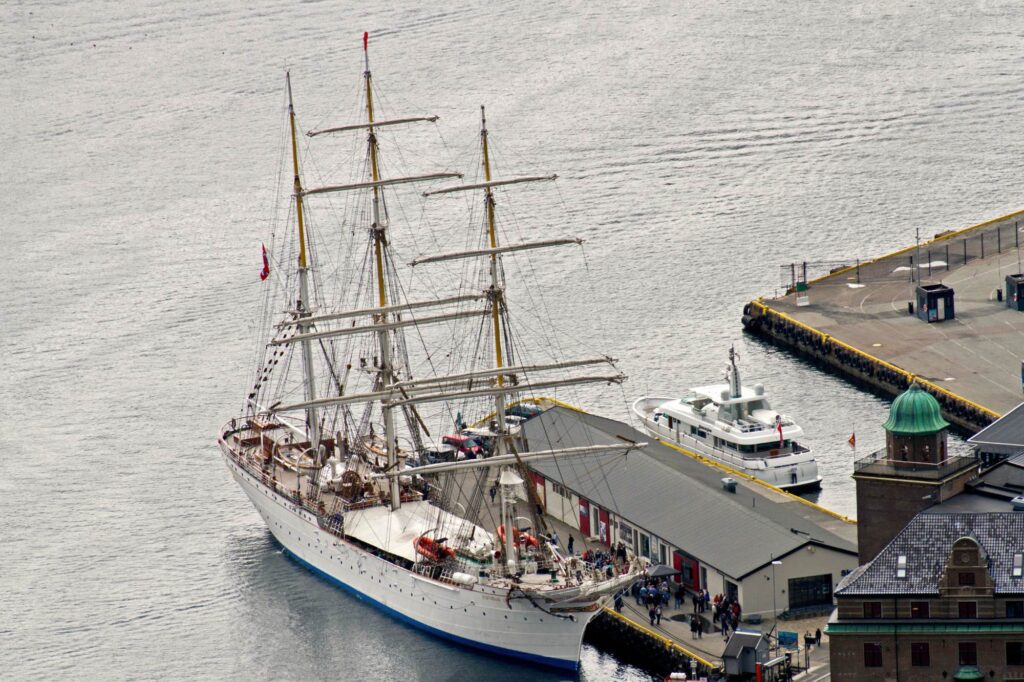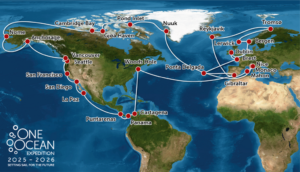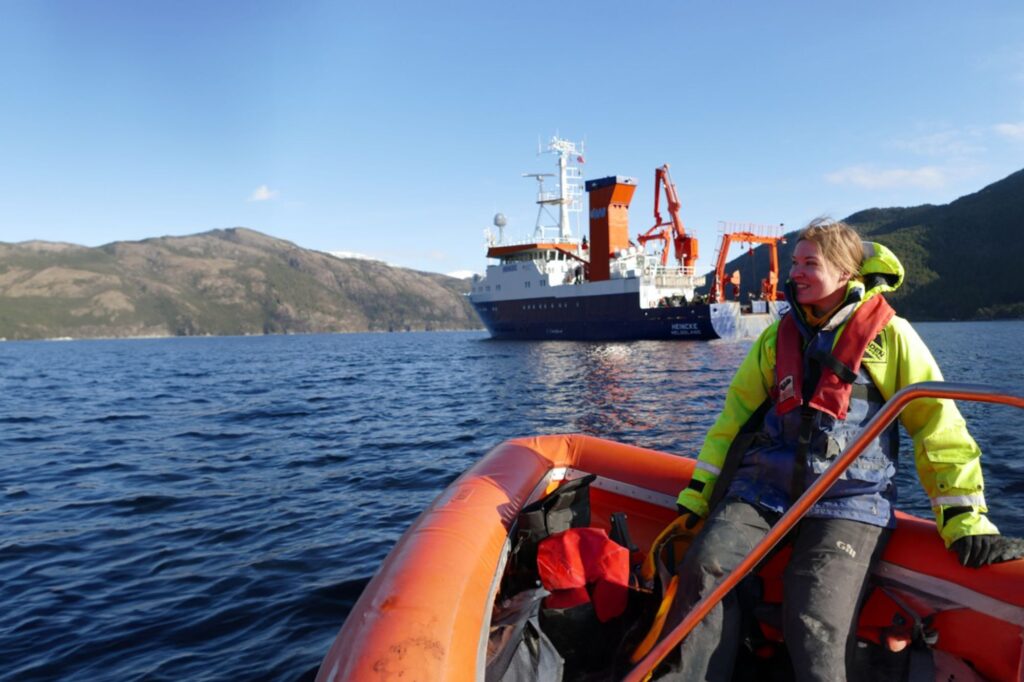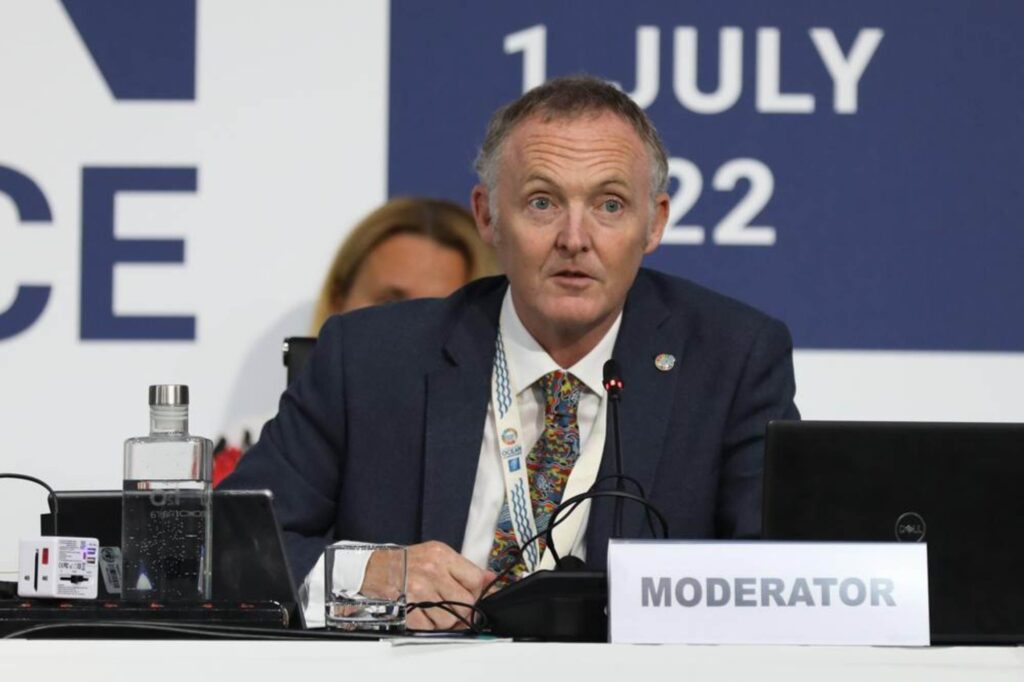The One Ocean Expedition
Monday 21 April 2025 - Friday 6 June 2025

The Statsraad Lehmkuhl embarks on a new grand voyage with One Ocean Expedition 2025-2026, with PML scientists Dr Saskia Rühl and Professor Steve Widdicombe onboard. Dates: April 2025 – April 2026 (PML participation 21st April – 6th June)
The year-long expedition will start in April 2025 and will cover the Atlantic Ocean, the Mediterranean Sea, the Arctic Ocean, the Pacific Ocean, and the Caribbean Sea, with stops in at least 20 ports across three continents.
The goal of the One Ocean Expedition is to raise awareness and share knowledge about the ocean’s crucial importance for a sustainable future from a global perspective.

Image above: Sailing route for the One Ocean Expedition
Meet the scientists onboard:
Dr Saskia Rühl, Digital Marine Biologist

Dr Saskia Rühl will be joining the One Ocean Expedition as part of the lecturing team for the ESA-led Advanced Training Course on Ocean Synergy Remote Sensing 2025, which covers the two of the earlier legs of the expedition. Her journey will go from Tromsø, Norway, via Reyjavik Iceland, down into the Mediterranean and into Nice, France, and taking six weeks, beginning in April, and finishing on 3rd June.
Whilst at sea, her involvement primarily focuses on teaching the 48 international students on board the Statsraad Lehmkuhl, and Dr Rühl will be lecturing on and demonstrating the biological carbon cycle, and plankton/particle imaging related techniques.
Dr Rühl will also be actively conducting research on board too, and will be collecting samples to characterise plankton communities and measure particulate organic carbon concentrations, withthe intent to publish the results upon her return.
Once anchored in Nice, at the Old Harbour, Saskia will be taking part in events on-board the ship as part of the third UN Ocean Conference 2025. There will be talks and demonstrations on board – open to the public – for attendees to find out more about what teams have been working on onboard the ship.
Saskia’s involvement in the One Ocean Expedition has been supported with thanks to the ESA.
Professor Steve Widdicombe, Director of Science

Professor Widdicombe will be joining the tall ship for the High-Level Discussions on the final passage before the UN Ocean Conference, joining in Mahon, Menorca and concluding in Nice, France, from 1st – 3rd June. He will meet with international leaders of ocean science and policy to discuss Earth Observation Action for a sustainable Ocean, and will share PML’s institutional priorities for a sustainable Ocean, and the importance of Earth Observation.
Additional involvement from PML:
Additionally, internationally acclaimed Remote Sensing Scientist Dr. Shubha Sathyendranath will participate in the expedition, as will student Salma Sheini, supported by the Trevor Platt Foundation, which upholds the legacy of Professor Trevor Platt, a highly renowned oceanographer and PML Fellow who passed away in 2020. Sheini will be conducting plankton sampling throughout the journey, and said: “I’m very excited to take part in the expedition. It’s unlike anything I’ve done before and I’m looking forward to broadening my knowledge and meeting everyone who is taking part.”
Professor Jamie Shutler, University of Exeter, and Honorary fellow of Plymouth Marine Laboratory, has been involved in designing this incredibly forward thinking and advanced teaching programme and cruise – the first marine science research and teaching cruise on a fully science equipped sailing ship. He is teaching the cohort before they embark on the ship in why and how they can study ocean carbon from space. Along with why the exchanges of energy, heat and carbon between the ocean and atmosphere control our climate, and why these processes are key if we want to quantify current and future ocean health.
Professor Shutler will also provide the cohort with insights and connections to the European Union funded efforts for monitoring and studying ocean carbon, along with the advances being made within the ocean carbon research that is funded by the European Space Agency and being pioneered by the teams he leads.
Current Events
No current events at this time.
Upcoming Events
No upcoming events.